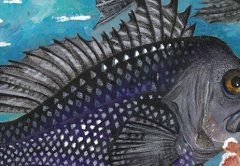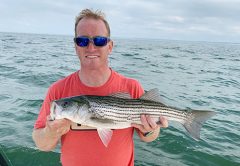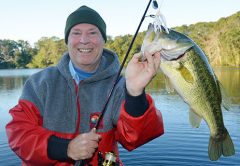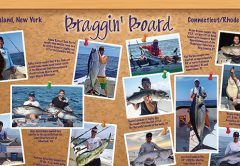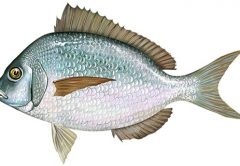One summer about a hundred years ago—I was twelve or so—I remember that acid rain was everywhere, all over the newspapers, on the news, in the magazines. Acid rain was polluting lakes and streams, cutting swaths through forests, killing birds and fish and god knows what else, and generally wreaking havoc on our environment. I was livid about it—livid the way people get about sinister forces they don’t understand.
That summer on our family vacation, two glorious August weeks in the unspoiled Adirondack wilderness, my brothers, Dad and I were fishing ourselves almost catatonic (at least I was) but we weren’t catching squat—no smallmouths, no pike, largemouths, even bullheads. My brothers, T and Fe, who were much older than I, and I imagine fishing for different reasons, took the repeated skunkings in stride. I knew better. Acid rain. Acid rain killed ‘em all.
It was in the second week, one evening as the light began to drain out of the westward sky that my brothers and I decided to take a quick shot across the lake before dinner, fish one cove and its long lanes of open water flanked by dense mats of lilypads. Where we seldom fished out of anything but the canoe or guideboat—I was raised on the virtues of stealth in fishing—a narrow window of fishable time and the need for three-man space dictated the use of the dreaded AlumaTub, an outboard-powered tin skiff with all the grace and aesthetic appeal of the oldest garbage truck in the Bronx.
As we clanged, winced, and cast our way around this prime cove, my brothers exchanged unpleasantries about the horrible racket each was causing, and we all bemoaned what the craft underfoot was probably doing to what were already long odds of catching so much as one stunted perch. Despite repeated admonitions that it was too dark for the spinner I was flinging, I maintained that the particular cove we were fishing was pike territory, and that I would be using my “pike spinner” until it was full-dark or we moved. I knew it didn’t matter anyway. In the Acid Rain Era, I still enjoyed the challenge of dropping long casts within inches of the weeds—a game that had already forced at least one mission into the lilypads to retrieve the aforementioned Mepps.
I was reasonably certain my spinner had once again dropped into the salad when, momentarily speechless, I watched my line start to angle away from the cover. Cranking for all I was worth, I soon gathered the slack and hollered out something about a fish. A moment later, my fish, a pike well over two feet long presented its flank and one of my brothers slipped a net under her. Honestly, I’d caught bullheads that fought harder, but I was so intensely relieved to see a fish that I just about hugged the bewildered critter. As I recall, over the days that followed, we all caught additional fish—both smallies and pike—and I doubt I said another word, then or ever thereafter, about acid rain.
I mention this because in recent springs, there have been so many fishermen wringing their hands about wild changes in the early-season fisheries—squid being one notable example—and also some major sighs of relief at the sudden appearance of “doomed” fish like school stripers and even some weakfish. It’s easy, especially in a season of persistent cold water and late-running fish, to lose sight of the normal fluctuations in fish stocks or migratory timing, to attribute a lack of fish to some catastrophic event, some dramatic but unseen change. It’s equally easy to interpret an event we’ve seen for a season or three as the new “normal.”
I have entertained grave concerns about the lack of a significant showing of squid in Block Island Sound, especially in light of the intense pressure those critters have faced in recent seasons when the endless snarl of regulations has given fishermen little choice but to pound the beach with fine twine. Then again, I’ve considered that for a few years now, and the squid piled up in ever-denser concentrations each consecutive spring—until last spring. I sweated that out until mid-summer, when it became clear that 2013 was just one screwy year for the commercial squid fishery. Later in the season, it came out that some of the squid buyers had been sourcing a fair amount of large stuff from—of all places—Gloucester, MA, a place that has not traditionally seen anything worthy of the title, “squid run.” What will happen in the coming weeks outside Shinnecock, and further west in the Babylon Channel, remains to be seen. all the accumulated worry burning off over the course of a few days.
Consider also all the knitted brows in recent seasons over what many have been calling a total lack of schoolie-sized bass in the overall striper stock: Somehow, amid all this genuine concern, numerous areas were just about rotten with nursery-schoolies last spring. I wouldn’t want to make any grand declarations based on any of this, but it does speak to the volumes we do not know about what’s unfolding beneath the water’s surface from here well past the horizon. Mother Nature abhors an expert.
What makes it all so tricky is that we are all witnessing change on a global climatic scale. We also live and fish in the long shadow of stocks that have buckled under awesome fishing pressure. It’s a delicate balancing act to move ahead with some measure of caution—to prove through our attitudes and behavior that we can learn from past mistakes—without becoming serial over-thinkers and over-reactors to every normal fluctuation in the wildly complex ecosystems we spend lifetimes trying to fathom.
[easy-social-share]




